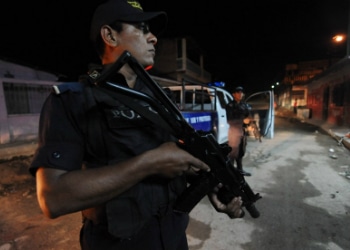Authorities in Honduras have touted a decline in homicides in recent years, but a series of massacres to start 2019 raises questions about the ongoing security situation in the Central American nation.
During the first two weeks of the new year, at least 30 people were killed in eight massacres* that took place across the country, from the northern Caribbean city of Puerto Cortés to western Olancho department and the capital Tegucigalpa, El Heraldo reported.
Local criminologists said rival gangs warring over territory and control of small-scale drug trafficking were responsible for the bloodshed, La Tribuna reported. A reduction in police operations after the Christmas season could also be contributing to the violence as gangs settle scores and seek extortion payments. The Barrio 18 and Mara Salvatrucha (MS13) are Honduras’ two dominant gangs.
SEE ALSO: InDepth Coverage of Homicides
When asked about the recent massacres, National Police spokesman Jair Meza told Confidencial that it’s important to remember that homicides are down in comparison to years past.
Homicides have dropped considerably since the country’s murder rate peaked at 86.5 per 100,000 citizens in 2011. The homicide rate was cut by more than half to 42.8 in 2017 and then to 40 in 2018, the lowest rate seen in more than a decade.
Experts told InSight Crime in November 2017 that a variety of factors have helped to reduce violence, such as the dismantling of large criminal networks and reforming and purging the national police.
InSight Crime Analysis
Though homicide rates have dropped in Honduras, the high body count to start the new year is a reminder that violence — fed by institutional corruption — continues to threaten the country’s long-term security.
While the review of the country’s police force, which began in 2016, has resulted in the dismissal or investigation of thousands of officers, the force continues to be beset by corruption. In October 2018, authorities charged and issued an arrest warrant for National Police Commissioner Lorgio Oquelí Mejía Tinoco and more than a dozen other officials for their alleged connection to a cattle trafficking network. Mejía Tinoco remains on the run.
This high-level misconduct also extends into Honduras’ political class. In November 2018, US authorities arrested former Honduran congressman Juan Antonio “Tony” Hernández, the brother of President Juan Orlando Hernández. Prosecutors allege the president’s brother is a “large-scale drug trafficker” who trafficked “multi-ton loads of cocaine” into the United States.
SEE ALSO: Honduras News and Profiles
Political elites have also been embroiled in a series of corruption scandals, including the pilfering of state resources and the diversion of millions of dollars of public money. It’s estimated that around $1 billion is lost to corruption annually in Honduras, according to the National Anti-Corruption Council (Consejo Nacional Anticorrupción – CNA).
What’s more, Honduras has one of the highest impunity rates in Latin America. Citizens have little faith in elected officials or the authorities tasked with protecting them from crime and violence, pushing many to flee. In the northern city of San Pedro Sula, considered one of the most violent in the world, a new migrant caravan — one of several to depart Central America in recent months — just left for the United States.
*This article was updated to include the most current number of massacres and victims in Honduras.

